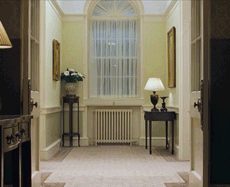I got this idea when playing me some need for speed. Video games often try to appear as living as possible. Take open-world games with cars: the traffic is made to seem absolutely natural. When you hear police radio, there is communication between police cars and HQ that imitates reality fairly well.
The only thing that prevents me from believing that city like Fairhaven from NFS: Most Wanted exists is:
Everything in the game is so videogame-y ridiculous. Cars that hardly ever break, and if they do they get automatically replaced straight away. Police seemingly unable to do anything about street racing. Roads that seem to be built just for illegal racing.
So, I thought, how could this work? What would the city have to be like?
Here's what I imagine it would have to be like:
1. The city (geography):
The city doesn't have much history. It's rather newly founded, but growing fast. There are no geographic boundaries that prevent it from growing, although the terrain is far from flat. Yet the city doesn't grow very wide - possibly for political reasons, like in the case of Hong Kong. The heart of the city is the downtown, a well-known commercial district. The city has an enormous airport, because it is one of the most prominent centers of global business. Despite the fact that most places in the city center are walking distance from each other, the city has an above average traffic. There is no public transport, because the people are too comfortable and they can all afford cars - not only that cars are relatively cheap here, the GDPPC (gross domestic product per capita) is high above average. As the city was growing fast in 80's, 90's and 00's, the infrastructure kept improving. Today the roads are purposefully overdesigned to accommodate further growth. Truth is, however, that this has recently been abused by illegal racers and this results in decline in traffic, as people are afraid of driving around the city and therefore they prefer to stay home.
2. Who pays? (economy):
There is no income tax in the city. This has attracted many influential businessmen and resulted in many corporate HQs being set up in the city. It's the Versailles of capitalism - who isn't here simply isn't. This is one of the few places in the world, where local administration gets majority of its money from something else than income tax - the budget of city is mostly paid through donations from investors and businessmen in the city. This forces the city to be "loyal" to the interests of the "1%". Social equality is a taboo.
3. Regency (politics):
The city is effectively ruled by the donators (who are also racers), who through their money maintain political power. There is a two-party system of government and both parties are connected to interested investors - donators. They are equally unpopular and they tend to switch in power every election cycle. Other political parties either not present at all, or have no power. This is because these parties have no money for campaigns and there is not enough of independent intellectuals around the city that would support these parties - vast majority of educated people are businessmen coming here from all around the world. The influence of donators reaches deep down in governmental structure and all its branches - legislative, judicial and executive. The most manipulated is the executive branch, namely police. The police is endorsed by many influential people and therefore it is able to enforce most laws very strictly. That makes it even more obvious how street racing is ignored. Many public figures "support" police in fighting illegal racing. It is beneficial for them in three things; first, it improves their public image - second, it makes it less likely that the public would get to know that they actually are street racers too - third, and most importantly, it gives them power over police. They can keep track of police equipment, vehicles, get access to police radio and they can get their own paid drivers to highway police.
4. Hobby of the rich (how illegal racing fits in all of this):
The city is very business-oriented and absolutely lacking in culture. Also, it is a trend among influential people globally to invent new common hobbies - it used to be tennis and golf. These two factors play a major role in why illegal racing has become so popular. Another explanation is purely psychological - some rich people may fear that their lives are wasted. This is often called "Onegin complex", based on the literal figure of Eugen Onegin, the disposable man. Racing may be a form of modern-day Russian roulette.
The races are all organized a long time ahead and the police is aware of them before they happen. Racers notify police to keep most traffic out of their way, however usually police doesn't have a complete route of the race - sometimes individual police station get each a part of the route and their communication between each other is scrambled by a support team that the racers pay to keep everything under control. Demolishing or damaging cars is quite regular here. Due to contacts that the racers have, they can get new cars for the price of their manufacturing. This applies even to rare models that officially only have a limited number of sold vehicles - usually if a racer presents a totaled rare vehicle, they can get a new one if they promise to dispose of any evidence of it. The roads and environment suffer heavily from races too, and that is paid in full by donations from racers. Often they add up a bit more money in order to make the road a bit more suitable for illegal racing.
Real-life cities that would be ideal for an illegal street racing city: Hong Kong, Singapore, Los Angeles, New York, Atlanta, Moscow.
Tuesday, February 19, 2013
Saturday, February 16, 2013
... She suggests that every human goes through a period of abjection as tiny children when we first realize that our bodies are separate from our parents' bodies — this sense of separation causes a feeling of extreme horror we carry with us throughout our lives. That feeling of abjection gets re-activated when we experience events that, however briefly, cause us to question the boundaries of our sense of self...These visions all remind us, at some level, that our selfhood is contained in what Star Trek aliens would call "ugly bags of mostly water." The only thing separating you from being a dead body is . . . almost nothing. When you feel the full weight of that sentence, or are confronted by its reality in the form of a corpse, your nausea is abjection.
...The repetition compulsion is a bit more complicated than Freud's famous definition — "the desire to return to an earlier state of things." On the surface, a repetition compulsion is something you experience fairly often. It's the urge to do something again and again...Freud was fascinated by this sinister side of the repetition compulsion, which is why he ultimately decided that the cause of our urge to repeat was directly linked to what he called "the death drive," or the urge to cease existing. After all, he reasoned, the ultimate "earlier state of things" is a state of non-existence before we were born.
io9.com/5893964/10-psychological-states-youve-never-heard-of-++-and-when-you-experienced-them/
...The repetition compulsion is a bit more complicated than Freud's famous definition — "the desire to return to an earlier state of things." On the surface, a repetition compulsion is something you experience fairly often. It's the urge to do something again and again...Freud was fascinated by this sinister side of the repetition compulsion, which is why he ultimately decided that the cause of our urge to repeat was directly linked to what he called "the death drive," or the urge to cease existing. After all, he reasoned, the ultimate "earlier state of things" is a state of non-existence before we were born.
io9.com/5893964/10-psychological-states-youve-never-heard-of-++-and-when-you-experienced-them/
Tuesday, February 12, 2013
Wednesday, February 6, 2013
Subscribe to:
Posts (Atom)



